新概念英语第二册19课件
合集下载
新概念第二册第19课课件
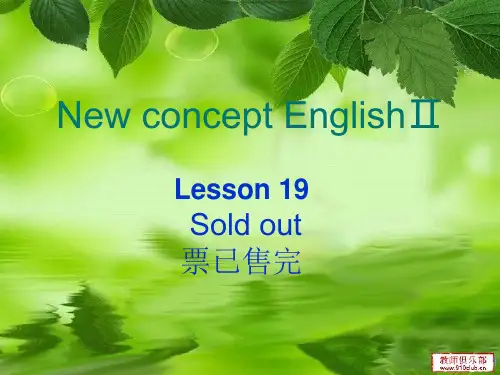
But they are for next Wednesday's performance.
for 在这表示将发生在某一具体时间的某事。
例句:I have a meeting for two o’clock. Have you got the train ticket for tomorrow?
New concept EnglishⅡ
Lesson 19
Sold out 票已售完
【New words and expressions 】 hurry v. 匆忙
ticket
office 售票处 pity n. 令人遗憾的事 exclaim v. 大声说 return v. 退回 sadly adv. 悲哀地, 丧气地
4、'Certainly,' the girl said, 'but they're for next Wednesday's performance. Do you still want them?'
next Wednesday's performance,用名 词所有格来取代时间,“……时间的” three days’ holiday today’s newspaper 用介词for, 起修饰作用
What a pity
1.Were you at theatre or a cinema?
2Did you thank the play was soon going to begin? 3Who was with you? 4She thought the play might have begun already ,didn’t she? 5What did you do 6When will the write see the play?
新概念英语第二册Lesson19(共55张PPT)
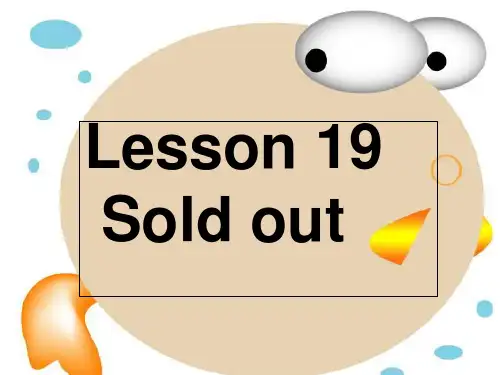
hurry to do
hurry in( come in 进来)匆匆忙忙地进来 hurry out (go out 出去)匆匆忙忙地出去 ② n. 急忙,匆忙,仓促 in a hurry <n.>匆忙 in no hurry <n.> 不匆忙 Sorry, I am in a hurry.对不起,我赶时间。 In his hurry to school, he forgot his books. In a/his hurry, he dropped some coins on the floor. I am in no hurry to get married. ③hurried adj. 匆忙的,仓促完成的 a hurried meal 匆匆忙忙的一顿饭 a hurried wedding 仓促的婚礼
•
10、阅读一切好书如同和过去最杰出 的人谈 话。2021/8/112021/8/112021/8/118/11/2021 7:55:03 PM
•
11、一个好的教师,是一个懂得心理 学和教 育学的 人。2021/8/112021/8/112021/8/11Aug-2111- Aug-21
•
12、要记住,你不仅是教课的教师, 也是学 生的教 育者, 生活的 导师和 道德的 引路人 。2021/8/112021/8/112021/8/11Wednesday, August 11, 2021
•
box n. 1) 盒子,箱子 2) 分隔的或围成的区域(戏院的包厢) 3) 小亭子,岗亭 the telephone box 电话亭 4) the box 电视(俚) boxer 拳击手 boxing 拳击运动 Boxing day 圣诞馈赠日
在英国,圣诞节的次日,若是星期日,则顺延一 日,惯例在此时赠送雇员,邮差等礼物。
hurry in( come in 进来)匆匆忙忙地进来 hurry out (go out 出去)匆匆忙忙地出去 ② n. 急忙,匆忙,仓促 in a hurry <n.>匆忙 in no hurry <n.> 不匆忙 Sorry, I am in a hurry.对不起,我赶时间。 In his hurry to school, he forgot his books. In a/his hurry, he dropped some coins on the floor. I am in no hurry to get married. ③hurried adj. 匆忙的,仓促完成的 a hurried meal 匆匆忙忙的一顿饭 a hurried wedding 仓促的婚礼
•
10、阅读一切好书如同和过去最杰出 的人谈 话。2021/8/112021/8/112021/8/118/11/2021 7:55:03 PM
•
11、一个好的教师,是一个懂得心理 学和教 育学的 人。2021/8/112021/8/112021/8/11Aug-2111- Aug-21
•
12、要记住,你不仅是教课的教师, 也是学 生的教 育者, 生活的 导师和 道德的 引路人 。2021/8/112021/8/112021/8/11Wednesday, August 11, 2021
•
box n. 1) 盒子,箱子 2) 分隔的或围成的区域(戏院的包厢) 3) 小亭子,岗亭 the telephone box 电话亭 4) the box 电视(俚) boxer 拳击手 boxing 拳击运动 Boxing day 圣诞馈赠日
在英国,圣诞节的次日,若是星期日,则顺延一 日,惯例在此时赠送雇员,邮差等礼物。
新概念第二册lesson19PPT课件
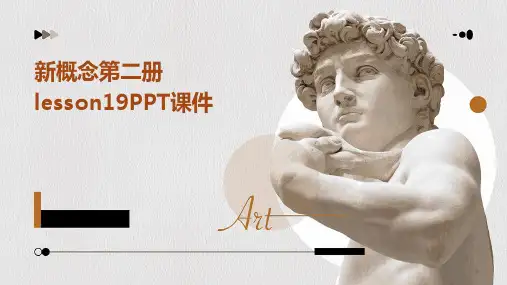
介绍定语从句的定义,说明限制性定语从句和非限制性定语从句的区别。
定语从句概念及种类
定语从句的构成和用法
非谓语动词概念及种类
非谓语动词的构成和用法
详细解释定语从句的构成方式,包括关系代词和关系副词的选用,给出相应的例句。
阐述非谓语动词的定义,列举常见的非谓语动词形式,如不定式、动名词和分词。
详细解释非谓语动词的构成方式,包括动词形式的变化和句子成分的搭配,给出相应的例句。
重点词汇2
championship(锦标赛)
例句
He won the world championship in tennis last year, making him one of the best players in the world.
重点词汇3
enthusiasm(热情)
例句
The crowd showed their enthusiasm for the home team by cheering and waving flags throughout the game.
针对不足之处进行反复练习,直至熟练掌握。
分享经验
邀请几位口语表达能力较强的同学分享自己的经验和技巧。
讨论问题
小组讨论中,同学们可以提出自己在口语表达中遇到的问题和困难。
互相鼓励
鼓励同学们大胆开口,不怕犯错,相互激励共同进步。
制定计划
根据个人情况制定口语提升计划,包括练习时间、方法、目标等。
06
语态概念及种类
语态的构成和用法
介绍时态的定义,列举常见的时态类型,如一般现在时、一般过去时、一般将来时等。
阐述语态的定义,说明主动语态和被动语态的区别,列举常见的被动语态形式。
新概念第二册第19课课件

分析
这是一个复合句,主句是“I now found myself wondering what I had got myself into”,其中“Although I had been looking forward to this trip for weeks”是让步 状语从句,表示尽管主人公一直期待这次旅行,但他现在却发现自己陷入了困境。
所学知识;小结部分总结本课重点难点,鼓励学生自我评价和反思。
学习方法和建议
学习方法
本课采用讲解、示范、练习和反馈相结合的教学方法,注重学生的主体性和实践 性,通过大量的口语和写作练习提高学生的语言运用能力。
学习建议
学生在学习本课时应积极参与课堂活动,认真听讲、思考和练习;同时要注重课 后的复习和巩固,通过多读、多写、多听、多说等方式提高英语水平。此外,学 生还可以借助网络资源和英语学习社群等渠道拓展学习内容和交流机会。
THANKS
感谢观看
动词不定式的用法:作为主语 、宾语、定语、状语等,表示 具体的或一次性的动作。
语法规则详解
现在完成时的构成
have/has + 过去分词,其中have用于第一人称和第三人称复数,has用于第三人称单 数。
情态动词should/ought to的用法
should表示现在或将来的责任或义务,ought to表示过去或将来的责任或义务,两者 均后接动词原形。
针对发音不准确的问题,可以通过模仿和跟读的方式提高发音准确性。
听后反思及策略调整
针对速记技巧不够熟练的问题,可以 在平时的训练中多加练习,形成自己 的速记符号和缩写方式。
针对对题目理解不够深入的问题,可 以在做题前仔细阅读题目和选项,预 测听力材料的内容,并在听后仔细核 对答案和听力原文。
这是一个复合句,主句是“I now found myself wondering what I had got myself into”,其中“Although I had been looking forward to this trip for weeks”是让步 状语从句,表示尽管主人公一直期待这次旅行,但他现在却发现自己陷入了困境。
所学知识;小结部分总结本课重点难点,鼓励学生自我评价和反思。
学习方法和建议
学习方法
本课采用讲解、示范、练习和反馈相结合的教学方法,注重学生的主体性和实践 性,通过大量的口语和写作练习提高学生的语言运用能力。
学习建议
学生在学习本课时应积极参与课堂活动,认真听讲、思考和练习;同时要注重课 后的复习和巩固,通过多读、多写、多听、多说等方式提高英语水平。此外,学 生还可以借助网络资源和英语学习社群等渠道拓展学习内容和交流机会。
THANKS
感谢观看
动词不定式的用法:作为主语 、宾语、定语、状语等,表示 具体的或一次性的动作。
语法规则详解
现在完成时的构成
have/has + 过去分词,其中have用于第一人称和第三人称复数,has用于第三人称单 数。
情态动词should/ought to的用法
should表示现在或将来的责任或义务,ought to表示过去或将来的责任或义务,两者 均后接动词原形。
针对发音不准确的问题,可以通过模仿和跟读的方式提高发音准确性。
听后反思及策略调整
针对速记技巧不够熟练的问题,可以 在平时的训练中多加练习,形成自己 的速记符号和缩写方式。
针对对题目理解不够深入的问题,可 以在做题前仔细阅读题目和选项,预 测听力材料的内容,并在听后仔细核 对答案和听力原文。
新概念英语第二册Lesson19课件
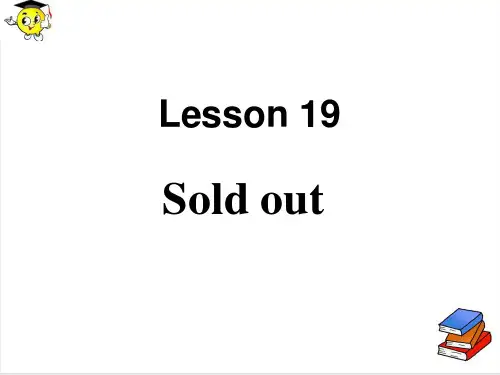
就在那时
售票处
'Can I return these two tickets? 'he asked.
'Certainly, 'the girl said.
I went back to the ticket office at once. go back to 返回 at once= right now=right away=immediately 'Could I have those two tickets please? 'I asked. 'Certainly, 'the girl said, 'but they're for next
sell out 售完 sell up 变卖财产 sell (名词) sale on sale 廉价出售 for sale 待售
★ hurry (hurriedly adv. 匆忙地)
• n. in a hurry • 匆忙地 • v. hurry up • 快点 • 难点: • hurry ( to ) +地点 匆忙赶往… • hurry to school • 匆忙去学校 • hurry downstairs • 匆忙下楼
•
I am afraid that…
二、 表示推测
• 情态动词must, might, may, could, can’t表示推测
• must表示非常肯定的猜测. 100%的可能性 “一定” • may/might /could 表示有可能的猜测. • 20%~80%的可能性 “可能” • can’t 表示肯定不可能. • 可能性几乎为零 “不可能”
Lesson 19
Sold out
新概念二-第19课课件
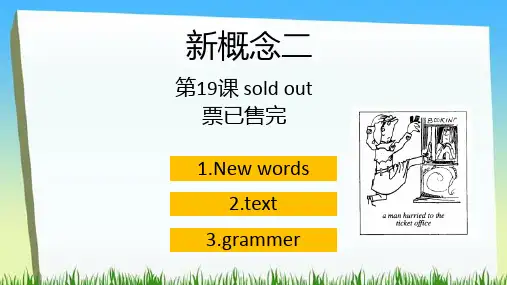
★3. return
(1)vi.回,返回: Tim has just returned from Australia 蒂姆刚从澳大利亚回来。 He returned home yesterday 他昨天回来的。 (2)vt.把……送回,归还,退回: He returned the books to the library. 他把书还给了图书馆。 He returned two tickets, as Jack and Tom were too busy and they couldn't go to the theatre. 他退了两张票,因为杰克和汤姆太忙了,不能去看戏。
课文注释
3. What a pity! 真可惜! 这是一个常用的表示可惜、遗憾的感叹句。我们还可以说: What a pity(it is) you can't see their performance! 你不能观看他们的演出真是遗憾! 4.I went back to the ticket office at once.我马上又回到售票处。 at once 为固定短语,在这里可译为“马上”、“立刻”: When he heard the news, he went home at once. 听到这消息,他立刻就回家了。 Please come at once.
8. -“Do you like WZRY?”-“C .Every one likes it.”
text
熟读课文:
The play may begin at any moment,’I said. It may have begun already,’Susan answered. I hurried to the ticket office. 'May I have two tickets please?'I asked. 'I’m sorry, we've sold out,' the girl said. What a pity!’ Susan exclaimed. Just then, a man hurried to the ticket office 'Can I return these two tickets?’ he asked'Certainly,'the girl said. I went back to the ticket office at once. 'Could I have those two tickets please?’I asked Certainly,’thegirl said,'butthey're for next Wednesday’s performance. Do you still want them?'I might as well have them,’I said sadly.
新概念英语第二册第19课完整ppt课件
• 'I might as well have them,' I said sadly.
• might as well 还是 … 好;不妨
• e.g: Since your car broke down, you
•
might as well use mine.
精选ppt
• 'The play may begin at any moment,' I said. 'It may have begun already,' Susan answered. 'I hurried to the ticket-office. 'May I have two tickets please ?' I asked. 'I'm sorry, we've sold out,' the girl said. 'What a pity!' Susan exclaimed.
精选ppt
• 5. return (v.) ☺返回
• return to sp.
•
☺ 退还
• Can I return these two tickets ?
You need return the book within 3 days.•(n.) 返程, Nhomakorabea返•
two return tickets to London
•
out of pity
•
出于同情
• e. g: I gave the beggar some
•
money out of pity.
精选ppt
• 4. exclaim (v.) 大声说
新概念二第19课课件
新概念二第19课课件
目录
• 课程介绍与目标 • 词汇学习与拓展 • 课文精读与理解 • 语法知识点梳理与运用 • 听力训练与提高 • 口语表达与交际能力培养 • 课程总结与回顾
01
课程介绍与目标
Chapter
本节课程主题
课程的中心话题
本节课主要围绕“The Secret of Success”这一主题展开,探讨成
01
02
03
04
下节课将学习定语从句和状语 从句的用法;
建议学生提前预习相关语法知 识,了解定语从句和状语从句
的基本概念和结构;
准备一些相关的例句和练习题 ,以便在课堂上更好地理解和
掌握语法知识;
继续加强听力训练,提高听力 水平。
THANKS
感谢观看
05
听力训练与提高
Chapter
听力材料选择及技巧指导
选择适合水平的听力材料
初级、中级、高级,逐步挑战难度。
技巧指导
预读选项、捕捉关键词、注意听力材料中的逻辑关系和语气语调等。
听力练习实例分析
实例一
分析一段对话或短文, 讲解听力技巧和解题思 路。
实例二
针对常考题型进行练习 ,如填空、选择、判断 等。
07
课程总结与回顾
Chapter
本节课程重点内容回顾
01
动词时态和语态的 深入讲解,包括现 在完成时、过去完 成时、将来完成时 等;
02
形容词和副词的比 较级和最高级用法 ;
03
复合句和并列句的 结构和用法;
04
听力训练:听懂并 理解关于日常生活 、工作、学习等方 面的对话或独白。
学生自我评价报告
情感态度与价值观目标
引导学生树立正确的成功观,认识到 成功需要付出努力和坚持不懈的精神 。
目录
• 课程介绍与目标 • 词汇学习与拓展 • 课文精读与理解 • 语法知识点梳理与运用 • 听力训练与提高 • 口语表达与交际能力培养 • 课程总结与回顾
01
课程介绍与目标
Chapter
本节课程主题
课程的中心话题
本节课主要围绕“The Secret of Success”这一主题展开,探讨成
01
02
03
04
下节课将学习定语从句和状语 从句的用法;
建议学生提前预习相关语法知 识,了解定语从句和状语从句
的基本概念和结构;
准备一些相关的例句和练习题 ,以便在课堂上更好地理解和
掌握语法知识;
继续加强听力训练,提高听力 水平。
THANKS
感谢观看
05
听力训练与提高
Chapter
听力材料选择及技巧指导
选择适合水平的听力材料
初级、中级、高级,逐步挑战难度。
技巧指导
预读选项、捕捉关键词、注意听力材料中的逻辑关系和语气语调等。
听力练习实例分析
实例一
分析一段对话或短文, 讲解听力技巧和解题思 路。
实例二
针对常考题型进行练习 ,如填空、选择、判断 等。
07
课程总结与回顾
Chapter
本节课程重点内容回顾
01
动词时态和语态的 深入讲解,包括现 在完成时、过去完 成时、将来完成时 等;
02
形容词和副词的比 较级和最高级用法 ;
03
复合句和并列句的 结构和用法;
04
听力训练:听懂并 理解关于日常生活 、工作、学习等方 面的对话或独白。
学生自我评价报告
情感态度与价值观目标
引导学生树立正确的成功观,认识到 成功需要付出努力和坚持不懈的精神 。
新概念第二册第19课课件
客人马上就到。 客人马上就到。
The guests may arrive at any moment. may have begun: Her friend may have gone abroad. They may be waiting for you at the airport.
Lesson 19 Sold out
Bell
• How many kinds of tickets can I buy?
• If I want to buy a ticket,what can I say? • Can(May) I have a ticket,please? • If I want to return the ticket,what can I say? • Can I return the ticket? • If there aren't any tickets,what can I say? • What a pity!
Lesson 19 Sold out
return : v. come back
return from in return for sth. / in return (that) + clause in exchange for or as payment 作为 的交换/回报 作为…的交换 的交换/
• How many tickets did you ask for? Two. • Did the girl at the ticket office have any left? No, she didn't. • What did she say? 'We've sold out.' • Was Susan disappointed ? Yes, she was. • Who hurried to the ticket office just then? A man did.
The guests may arrive at any moment. may have begun: Her friend may have gone abroad. They may be waiting for you at the airport.
Lesson 19 Sold out
Bell
• How many kinds of tickets can I buy?
• If I want to buy a ticket,what can I say? • Can(May) I have a ticket,please? • If I want to return the ticket,what can I say? • Can I return the ticket? • If there aren't any tickets,what can I say? • What a pity!
Lesson 19 Sold out
return : v. come back
return from in return for sth. / in return (that) + clause in exchange for or as payment 作为 的交换/回报 作为…的交换 的交换/
• How many tickets did you ask for? Two. • Did the girl at the ticket office have any left? No, she didn't. • What did she say? 'We've sold out.' • Was Susan disappointed ? Yes, she was. • Who hurried to the ticket office just then? A man did.
新概念第二册Lesson-19课件
• ② n. 急忙,匆忙,仓促 In a/his hurry, he dropped some coins on the floor. in a hurry <n.>匆忙 in no hurry <n.> 不匆忙 • I am in no hurry. 我不急 hurry与busy 1.If you are not in a hurry. 如果你不急(时 间、 动作上的紧急) • 2. If you are not busy. 如果你不忙(行为上 的匆忙)
一般情况下could是can的过去式但是1could也可以代替can表示更加委婉客气的提出问题或提出要求不是can的过去式
Lesson 19
Sold out 票已售完
We have sold out
!!!!!!!!!!!!!!!!!!
Sold out
How will you feel if the tickets for tiny times are sold out?
had better+动词原形 最好……(积极心态)
情态动词:can,may,must
can,may,must + 动词原形
• 1.must 的用法
(1)表示-必须要做的事
※We must do every thing step by step. ※We must show concern for every student.
Can和may表示-请求,询问的区别: Can 可以用在第一,二人称. may 只能用第一人称.
Can and May
• can和may都可以表示请求,can可以用could,may可 以用might代替,语气更委婉,更有礼貌,但时间上没 有区别 • Can I use your phone please?/Could I use your phone please? • May I use your phone please?/Might I use your phone please? • 含有情态动词的回答: • 肯定:Of course you can/may. • 否定:No, you can’t/ may not.
- 1、下载文档前请自行甄别文档内容的完整性,平台不提供额外的编辑、内容补充、找答案等附加服务。
- 2、"仅部分预览"的文档,不可在线预览部分如存在完整性等问题,可反馈申请退款(可完整预览的文档不适用该条件!)。
- 3、如文档侵犯您的权益,请联系客服反馈,我们会尽快为您处理(人工客服工作时间:9:00-18:30)。
• She must be a model. (must 一定, 很可能) • She may be a model. (may 有可能) • She can't be a model. (can't 不可能) • may,must,can't + have done,表示对过去的推测
• She must/may/can't have been a model. • I must/may/can’t have watched TV • ☆still:还,可以和任意时态连用
'I might as well have them,' I said sadly.
• may/might as well 不妨…,不如…的好, 还是…的好。无可奈何的语气。
• 例句:There’s nothing to do now, so I may as well go to bed.
• Since you will know it sooner or later, I might as well tell you now.
在此时赠送雇员,邮差等礼。
• ★pity n. 令人遗憾的事 • What a pity! <n.> 真遗憾! • It is a pity to be grown up. (it做形式主语)
• It is a pity to steal a bicycle. • I am sorry. <adj.> 我感到很遗憾. • I am sorry to hear that.听到这个消息我很遗
• exclaim 大声说,比shout正式。
Can I return these two tickets?
• return [v.]= give back 退回; • return [adj.] 往返的 • 例:a return ticket 往返票
'Certainly,' the girl said.
box
• box n. • 1) 盒子,箱子 • 2) 分隔的或围成的区域(戏院的包厢) • 3) 小亭子,岗亭 • the telephone box 电话亭 • 4) the box 电视(俚) • boxer 拳击手 • boxing 拳击运动 • Boxing day 圣诞馈赠日 • 在英国,圣诞节的次日,若是星期日,则顺延一日,惯例
• certain = be sure • 例句:I’m sure it will rain. = It’s certain
that it will rain.
• certainly = of course • 例句:Certainly you can do it. = Of course
you can do it.
• ☆hurry v.匆忙 • n.in a hurry • if you are not in a hurry(时间上) • if you are • hurried adj. 匆忙的,仓促完成的 • a hurried meal 匆匆忙忙的一顿饭 • a hurried wedding 仓促的婚礼
• 作动词---------hurried----------hurried 匆忙, 迅速或仓促地做某事
• eg. Don’t hurry, there is plenty of time. 不 要着急,我们有大量时间。
• eg. I hurried to the ticket office. 我匆忙地赶 到售票处。
• already可放句中或句末。 • 1.同现在完成时连用 • I have already made a big start in this
direction. • 我在这个方向已经有了一个大的开端。
• 2.同一般现在时连用 • It's eight already. 现在已经是8点了。
• 3.同一般过去时连用 • I was happy for her; she looked better
枉了
(the) more's the pity 真可怜, 真糟糕, 更冤
• The pity of it! • 真可惜! 真遗憾!
What a pity! 多么可惜[遗憾]!
• ★exclaim v. 大声说
• ① vt.&vi.(由于痛苦、愤怒、惊异、欣喜等)叫喊,惊叫
• When she saw the gift, she exclaimed in delight. • ② vi.(表示抗议等)大声叫喊
• She exclaimed against the rudeness of the young man. • shout =cry =call out 大声喊 • [搭配]PREP.at对… 大叫, in … 地大叫: 抗议;
• They exclaimed in horror at the price. • 他们看到这个价钱惊恐地大叫起来。 • over 因… 惊叹:
更多用法:
He sold his watch at a low price. He sold his watch for ten pounds.
'What a pity!’ Susan exclaimed.
• 感叹句 What a pity (it is)!
• 陈述句 It’s a pity that you can’t come. It is a pity to grow up.
• eg. I hurried to school. 我匆忙地赶到学校 。
• eg. We are late, I must hurry you. 我们已 经迟到,我必须催促你。
ticket office
• booking office 火车站的、戏院等地方的售 票处
• box office 戏院、剧院的售票处(专指) • a box office success 卖座的,买得好的
already. • 我真为她高兴;她看起来已经好多了。
• 4.同一般将来时连用 • This time tomorrow I'll be already in Tokyo. • 明天的这个时候,我就已经在东京了。
• 5.同现在进行时连用 • Britain is already exploiting a little coal. • 英国已经在开采少量的煤。
• He may come tomorrow./He might come tomorrow. • may/might +have 动词过去分词:表示对过去事情的
推测 • He may have telephoned last night, but I’m not
sure. • He might have telephoned last night, but I’m not
• 含有情态动词的普通回答: • 肯定:Of course you can/may. • 否定:No, you can’t/ may not.
• 2、may和might还可以表示推测,“可能……”。 may可以用might代替,语气更委婉,更有礼貌,但时 间上没有区别
• may/might +动词原形:表示对现在或未来事情的推测
• standing in front of shop windows exclaiming over the beautiful clothes
• 站在商店橱窗前对漂亮的衣服惊叹 • with…地惊叹:
• She exclaimed with delight at the sight of the presents. • 看到礼物她高兴地叫了起来。
• “推测”
• 对什么时候的推测不在于must,may,can't是什 么时态,而在于后面加的是原形还是have done
• must,may,can't+动词原形:对现在、未来的 推测
• must,may,can't+have done:对过去的推测
• must:一定,很可能;may:有可能;can't: 不可能
• [注]只是针对现在、未来。不用于过去时,过 去时的是虚拟语气
We've sold out (the tickets). = The tickets have been sold out. • sell out 卖完,卖光。sell up 变卖(财产)
。 • 例句:He sold up and went to Africa.
But they are for next Wednesday's performance.
• for 在这表示将发生在某一具体时间的某事 。
• 例句:I have a meeting for two o’clock. Have you got the train ticket for tomorrow?
憾
• 注意 sorry 与 pity 词性上的区别
• 习惯用语
• have pity on sb. • 可怜某人
taken pity on sb. 可怜某人
• in pity (of) • 非常可惜...
It is a thousand -ties that...
怜悯...; 同情
• out of pity • 出于怜悯[同情]
• ☆might(may) as well+动词原形:“还是…… 好”(无可奈何)
• had better+动词原形:“最好” (积极心态)
• eg:天看上去要下雨了:I had better take an umbrella.
• 已经下了,非带不可:I might as well take the umbrella with me.
• She must/may/can't have been a model. • I must/may/can’t have watched TV • ☆still:还,可以和任意时态连用
'I might as well have them,' I said sadly.
• may/might as well 不妨…,不如…的好, 还是…的好。无可奈何的语气。
• 例句:There’s nothing to do now, so I may as well go to bed.
• Since you will know it sooner or later, I might as well tell you now.
在此时赠送雇员,邮差等礼。
• ★pity n. 令人遗憾的事 • What a pity! <n.> 真遗憾! • It is a pity to be grown up. (it做形式主语)
• It is a pity to steal a bicycle. • I am sorry. <adj.> 我感到很遗憾. • I am sorry to hear that.听到这个消息我很遗
• exclaim 大声说,比shout正式。
Can I return these two tickets?
• return [v.]= give back 退回; • return [adj.] 往返的 • 例:a return ticket 往返票
'Certainly,' the girl said.
box
• box n. • 1) 盒子,箱子 • 2) 分隔的或围成的区域(戏院的包厢) • 3) 小亭子,岗亭 • the telephone box 电话亭 • 4) the box 电视(俚) • boxer 拳击手 • boxing 拳击运动 • Boxing day 圣诞馈赠日 • 在英国,圣诞节的次日,若是星期日,则顺延一日,惯例
• certain = be sure • 例句:I’m sure it will rain. = It’s certain
that it will rain.
• certainly = of course • 例句:Certainly you can do it. = Of course
you can do it.
• ☆hurry v.匆忙 • n.in a hurry • if you are not in a hurry(时间上) • if you are • hurried adj. 匆忙的,仓促完成的 • a hurried meal 匆匆忙忙的一顿饭 • a hurried wedding 仓促的婚礼
• 作动词---------hurried----------hurried 匆忙, 迅速或仓促地做某事
• eg. Don’t hurry, there is plenty of time. 不 要着急,我们有大量时间。
• eg. I hurried to the ticket office. 我匆忙地赶 到售票处。
• already可放句中或句末。 • 1.同现在完成时连用 • I have already made a big start in this
direction. • 我在这个方向已经有了一个大的开端。
• 2.同一般现在时连用 • It's eight already. 现在已经是8点了。
• 3.同一般过去时连用 • I was happy for her; she looked better
枉了
(the) more's the pity 真可怜, 真糟糕, 更冤
• The pity of it! • 真可惜! 真遗憾!
What a pity! 多么可惜[遗憾]!
• ★exclaim v. 大声说
• ① vt.&vi.(由于痛苦、愤怒、惊异、欣喜等)叫喊,惊叫
• When she saw the gift, she exclaimed in delight. • ② vi.(表示抗议等)大声叫喊
• She exclaimed against the rudeness of the young man. • shout =cry =call out 大声喊 • [搭配]PREP.at对… 大叫, in … 地大叫: 抗议;
• They exclaimed in horror at the price. • 他们看到这个价钱惊恐地大叫起来。 • over 因… 惊叹:
更多用法:
He sold his watch at a low price. He sold his watch for ten pounds.
'What a pity!’ Susan exclaimed.
• 感叹句 What a pity (it is)!
• 陈述句 It’s a pity that you can’t come. It is a pity to grow up.
• eg. I hurried to school. 我匆忙地赶到学校 。
• eg. We are late, I must hurry you. 我们已 经迟到,我必须催促你。
ticket office
• booking office 火车站的、戏院等地方的售 票处
• box office 戏院、剧院的售票处(专指) • a box office success 卖座的,买得好的
already. • 我真为她高兴;她看起来已经好多了。
• 4.同一般将来时连用 • This time tomorrow I'll be already in Tokyo. • 明天的这个时候,我就已经在东京了。
• 5.同现在进行时连用 • Britain is already exploiting a little coal. • 英国已经在开采少量的煤。
• He may come tomorrow./He might come tomorrow. • may/might +have 动词过去分词:表示对过去事情的
推测 • He may have telephoned last night, but I’m not
sure. • He might have telephoned last night, but I’m not
• 含有情态动词的普通回答: • 肯定:Of course you can/may. • 否定:No, you can’t/ may not.
• 2、may和might还可以表示推测,“可能……”。 may可以用might代替,语气更委婉,更有礼貌,但时 间上没有区别
• may/might +动词原形:表示对现在或未来事情的推测
• standing in front of shop windows exclaiming over the beautiful clothes
• 站在商店橱窗前对漂亮的衣服惊叹 • with…地惊叹:
• She exclaimed with delight at the sight of the presents. • 看到礼物她高兴地叫了起来。
• “推测”
• 对什么时候的推测不在于must,may,can't是什 么时态,而在于后面加的是原形还是have done
• must,may,can't+动词原形:对现在、未来的 推测
• must,may,can't+have done:对过去的推测
• must:一定,很可能;may:有可能;can't: 不可能
• [注]只是针对现在、未来。不用于过去时,过 去时的是虚拟语气
We've sold out (the tickets). = The tickets have been sold out. • sell out 卖完,卖光。sell up 变卖(财产)
。 • 例句:He sold up and went to Africa.
But they are for next Wednesday's performance.
• for 在这表示将发生在某一具体时间的某事 。
• 例句:I have a meeting for two o’clock. Have you got the train ticket for tomorrow?
憾
• 注意 sorry 与 pity 词性上的区别
• 习惯用语
• have pity on sb. • 可怜某人
taken pity on sb. 可怜某人
• in pity (of) • 非常可惜...
It is a thousand -ties that...
怜悯...; 同情
• out of pity • 出于怜悯[同情]
• ☆might(may) as well+动词原形:“还是…… 好”(无可奈何)
• had better+动词原形:“最好” (积极心态)
• eg:天看上去要下雨了:I had better take an umbrella.
• 已经下了,非带不可:I might as well take the umbrella with me.
